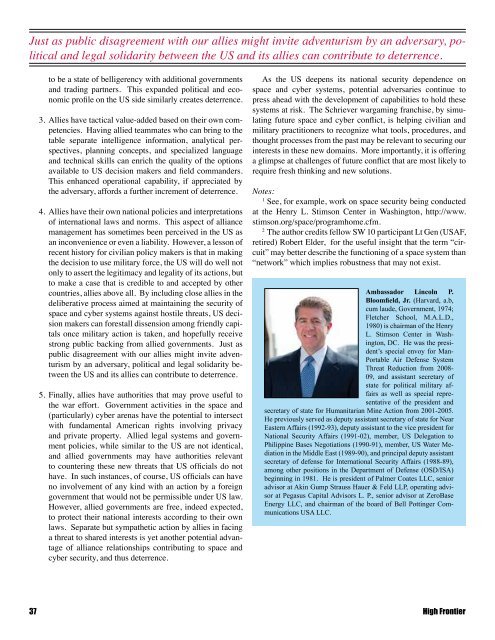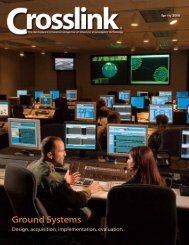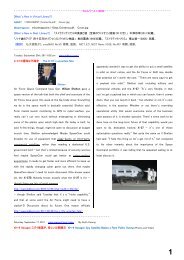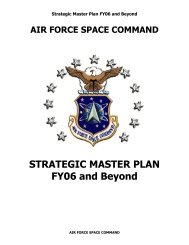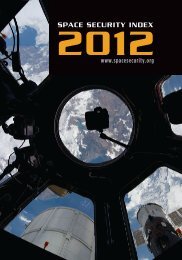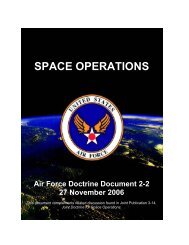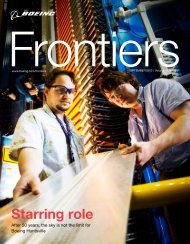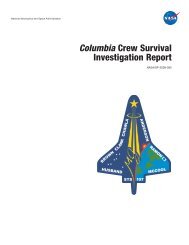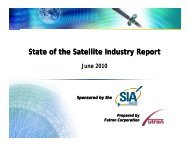Schriever Wargame 2010 - Air Force Space Command
Schriever Wargame 2010 - Air Force Space Command
Schriever Wargame 2010 - Air Force Space Command
Create successful ePaper yourself
Turn your PDF publications into a flip-book with our unique Google optimized e-Paper software.
Just as public disagreement with our allies might invite adventurism by an adversary, political<br />
and legal solidarity between the US and its allies can contribute to deterrence.<br />
to be a state of belligerency with additional governments<br />
and trading partners. This expanded political and economic<br />
profile on the US side similarly creates deterrence.<br />
3. Allies have tactical value-added based on their own competencies.<br />
Having allied teammates who can bring to the<br />
table separate intelligence information, analytical perspectives,<br />
planning concepts, and specialized language<br />
and technical skills can enrich the quality of the options<br />
available to US decision makers and field commanders.<br />
This enhanced operational capability, if appreciated by<br />
the adversary, affords a further increment of deterrence.<br />
4. Allies have their own national policies and interpretations<br />
of international laws and norms. This aspect of alliance<br />
management has sometimes been perceived in the US as<br />
an inconvenience or even a liability. However, a lesson of<br />
recent history for civilian policy makers is that in making<br />
the decision to use military force, the US will do well not<br />
only to assert the legitimacy and legality of its actions, but<br />
to make a case that is credible to and accepted by other<br />
countries, allies above all. By including close allies in the<br />
deliberative process aimed at maintaining the security of<br />
space and cyber systems against hostile threats, US decision<br />
makers can forestall dissension among friendly capitals<br />
once military action is taken, and hopefully receive<br />
strong public backing from allied governments. Just as<br />
public disagreement with our allies might invite adventurism<br />
by an adversary, political and legal solidarity between<br />
the US and its allies can contribute to deterrence.<br />
5. Finally, allies have authorities that may prove useful to<br />
the war effort. Government activities in the space and<br />
(particularly) cyber arenas have the potential to intersect<br />
with fundamental American rights involving privacy<br />
and private property. Allied legal systems and government<br />
policies, while similar to the US are not identical,<br />
and allied governments may have authorities relevant<br />
to countering these new threats that US officials do not<br />
have. In such instances, of course, US officials can have<br />
no involvement of any kind with an action by a foreign<br />
government that would not be permissible under US law.<br />
However, allied governments are free, indeed expected,<br />
to protect their national interests according to their own<br />
laws. Separate but sympathetic action by allies in facing<br />
a threat to shared interests is yet another potential advantage<br />
of alliance relationships contributing to space and<br />
cyber security, and thus deterrence.<br />
As the US deepens its national security dependence on<br />
space and cyber systems, potential adversaries continue to<br />
press ahead with the development of capabilities to hold these<br />
systems at risk. The <strong>Schriever</strong> wargaming franchise, by simulating<br />
future space and cyber conflict, is helping civilian and<br />
military practitioners to recognize what tools, procedures, and<br />
thought processes from the past may be relevant to securing our<br />
interests in these new domains. More importantly, it is offering<br />
a glimpse at challenges of future conflict that are most likely to<br />
require fresh thinking and new solutions.<br />
Notes:<br />
1<br />
See, for example, work on space security being conducted<br />
at the Henry L. Stimson Center in Washington, http://www.<br />
stimson.org/space/programhome.cfm.<br />
2<br />
The author credits fellow SW 10 participant Lt Gen (USAF,<br />
retired) Robert Elder, for the useful insight that the term “circuit”<br />
may better describe the functioning of a space system than<br />
“network” which implies robustness that may not exist.<br />
Ambassador Lincoln P.<br />
Bloomfield, Jr. (Harvard, a.b,<br />
cum laude, Government, 1974;<br />
Fletcher School, M.A.L.D.,<br />
1980) is chairman of the Henry<br />
L. Stimson Center in Washington,<br />
DC. He was the president’s<br />
special envoy for Man-<br />
Portable <strong>Air</strong> Defense System<br />
Threat Reduction from 2008-<br />
09, and assistant secretary of<br />
state for political military affairs<br />
as well as special representative<br />
of the president and<br />
secretary of state for Humanitarian Mine Action from 2001-2005.<br />
He previously served as deputy assistant secretary of state for Near<br />
Eastern Affairs (1992-93), deputy assistant to the vice president for<br />
National Security Affairs (1991-02), member, US Delegation to<br />
Philippine Bases Negotiations (1990-91), member, US Water Mediation<br />
in the Middle East (1989-90), and principal deputy assistant<br />
secretary of defense for International Security Affairs (1988-89),<br />
among other positions in the Department of Defense (OSD/ISA)<br />
beginning in 1981. He is president of Palmer Coates LLC, senior<br />
advisor at Akin Gump Strauss Hauer & Feld LLP, operating advisor<br />
at Pegasus Capital Advisors L. P., senior advisor at ZeroBase<br />
Energy LLC, and chairman of the board of Bell Pottinger Communications<br />
USA LLC.<br />
37 High Frontier


